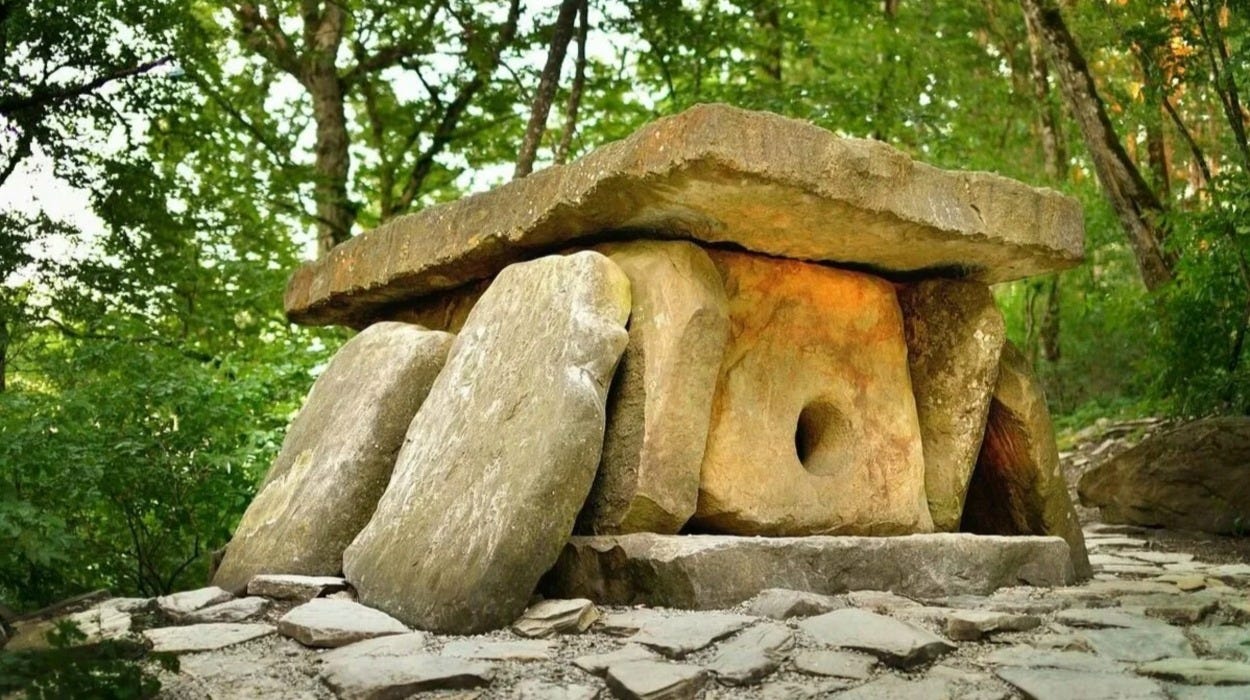Three Sisters: a Kijk Folktale
Kijk elders have a story about the Dolmens of Ciscaucasia. Tevfik Esenç told it to me one morning as we walked through Gaziosmanpaşa in search of what he called “the best coffee in Yıldıztabya."
Kijk elders have a story about the Dolmens of Ciscaucasia. Tevfik Esenç told it to me one morning as we walked through Gaziosmanpaşa in search of what he called “the best coffee in Yıldıztabya,” and I later heard it again from Ghiçe Thageledj, an old Kijk who cuts hair in Bağlarbaşı. The story goes like this:
There was a couple who lived in the forest above the northernmost Kijk village, where the men are strong and the women are loud and the children are afraid of nothing. The wife sold healing herbs and knew the old funeral songs. The husband was a “forest-shepherd”1 who tended sheep and scared the walking trees out of the village. The husband and wife were growing old and had no children, despite the wife’s nightly prayers to St. Nino.
Every year on the night of the first Saturday of Great Lent the walking trees walked amongst the dwellings of the village and ripped the arms off any Kijk outside his home. After their walk amongst the dwellings the trees would dance zikr until the forest-shepherd chased them off with his axe and his drum. The villagers knew to stay indoors that night, yet every year one of them would lose his arms.
The first Saturday night of the Great Lent of the husband and wife’s 60th year there was a fire in the village, and the villagers, fearing the flames more than the limb-ripping trees, ran from their homes to put it out. And so a dozen or more men lost their arms to the trees, and in mourning and rage the villagers spat on the forest-shepherd and called him cursed. That night the wife’s prayers to St. Nino were answered, and she became pregnant. But she was no longer invited to sing at funerals.
That autumn she birthed twins, and as they grew the two girls were called “The Three Sisters” for though they were only two, all who met them had the impression of a third sister, unseen, who lurked beyond or beneath what was visible. Their mother taught them to find the healing herbs and to sing the old funeral songs, and their father gave them axes and drums and introduced them to the walking trees.
The husband and wife died on the eve of the Great Lent when the girls were fourteen years old, so the village was without a forest-shepherd with only three days before the first Saturday night. Three days was not enough time to find a new forest-shepherd in the southern villages, and so on the dreaded night of the walking trees, the villagers extinguished their fires and barred their doors and prayed to St. Nino.
The trees walked amongst the dwellings and found no men and no women about. No villagers lost their arms. The trees danced zikr in the center of the village. The trees knew the forest-shepherd was dead, and with no axe or drum to fear they danced with abandon. The dwellings shook at the violence of their dancing. Again and again they danced zikr in the center of the village. For hours they danced, until just before dawn, when the Three Sisters came down from the forest with axes and drums. The unseen sister stood on the southern edge of the village; the twins at the east and the west.
Once each had found her place at the edge of the village, the Three Sisters moved slowly towards the village center hitting her axe on her drum and singing in a shrill, ululating voice a new funeral song, the funeral song of the walking trees. The trees stopped dancing zikr. They fled north to the forest as the Three Sisters approached them. The thwack of the axes on the drums grew unbearable, and in desperation the trees threw together Dolmens, shelters of stone. They climbed inside their shelters and pulled on top of themselves large flat stones, which, they soon discovered, they could not lift again. The Dolmens, meant for protection, became tombs, and the walking trees were never seen again.
As you know, the Kijk people have no written language, and “forest-shepherd” is only an approximate translation.




